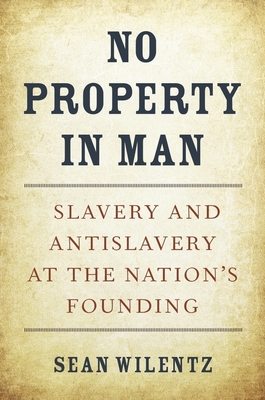

 Harvard University Press
Harvard University Press
No Property in Man: Slavery and Antislavery at the Nation's Founding


Key Metrics
- Sean Wilentz
- Harvard University Press
- Hardcover
- 9780674972223
- 8.5 X 5.7 X 1.1 inches
- 1.15 pounds
- History > United States - Revolutionary Period (1775-1800)
- English
 Secure Transaction
Secure TransactionBook Description
A radical reconstruction of the founders' debate over slavery and the Constitution, by the best-selling, award-winning author of The Rise of American Democracy.
Americans revere the Constitution even as they argue fiercely over its original toleration of slavery. Some historians have charged that slaveholders actually enshrined human bondage at the nation's founding. The acclaimed political historian Sean Wilentz shares the dismay but sees the Constitution and slavery differently. Although the proslavery side won important concessions, he asserts, antislavery impulses also influenced the framers' work. Far from covering up a crime against humanity, the Constitution restricted slavery's legitimacy under the new national government. In time, that limitation would open the way for the creation of an antislavery politics that led to Southern secession, the Civil War, and Emancipation.
Wilentz's controversial and timely reconsideration upends orthodox views of the Constitution. He describes the document as a tortured paradox that abided slavery without legitimizing it. This paradox lay behind the great political battles that fractured the nation over the next seventy years. As Southern Fire-eaters invented a proslavery version of the Constitution, antislavery advocates, including Abraham Lincoln and Frederick Douglass, proclaimed antislavery versions based on the framers' refusal to validate what they called property in man.
No Property in Man invites fresh debate about the political and legal struggles over slavery that began during the Revolution and concluded with the Confederacy's defeat. It drives straight to the heart of the most contentious and enduring issue in all of American history.
Author Bio
Sean Wilentz studies U.S. political and social history. He received his Ph.D. in history from Yale University (1980) after earning bachelor’s degrees from Columbia University (1972) and Balliol College, Oxford University (1974).
Chants Democratic (1984), which won several national prizes, including the Albert J. Beveridge Award of the American Historical Association, shows how the working class emerged in New York City and examines the changes in politics and political thought that came with it.
In The Kingdom of Matthias (1994), Professor Wilentz and coauthor Paul E. Johnson tell the story of a bizarre religious cult that sprang up in New York City in the 1830s, exploring in the process the darker corners of the 19th-century religious revival known as the Second Great Awakening. Professor Wilentz is also the coauthor and coeditor of The Key of Liberty (1993) and the editor of several other books, including The Rose and the Briar (2004, Greil Marcus coeditor), a collection of historical essays and artistic creations inspired by American ballads.
His The Rise of American Democracy: Jefferson to Lincoln (2005), was awarded the Bancroft Prize and was a finalist for the Pulitzer Prize. Subsequent books include The Age of Reagan: A History, 1974-2008, a reconsideration of U.S. politics since the Watergate affair; Bob Dylan in America, a consideration of Dylan's place in American cultural history; and The Politicians & The Egalitarians: The Hidden History of American Politics, a thematic collection of essays covering American political history from the Revolution through the 1960s.
His most recent study, No Property in Man: Slavery and Antislavery at the Nation’s Founding, based on his Nathan I. Huggins Lectures at Harvard, appeared in 2018 and was the recipient of the annual Thomas A. Cooley Book Prize for the best book on the Constitution, awarded by the Georgetown University Law Center. In 2020, the Library of America published the first of three projected volumes of his authoritative edition of the writings of the historian Richard Hofstadter.
Professor Wilentz has received numerous fellowships from, among other institutions, the John Simon Guggenheim Foundation, the American Council of Learned Societies, and the American Academy in Berlin. Formerly a contributing editor to The New Republic, and currently a member of the editorial boards of Dissent and Democracy, he lectures frequently and has contributed some four hundred articles, reviews, and op-ed pieces to publications such as the New York Review of Books, the New York Times, the Washington Post, the Los Angeles Times, The Atlantic, the London Review of Books, The American Scholar, The Nation, Le Monde, and Der Spiegel.
He has also given congressional testimony, notably before the House Judiciary Committee in 1998. His writings on American music have earned him two Grammy nominations and two Deems Taylor-ASCAP awards.
Source: Princeton University
Videos






Community reviews
Write a ReviewNo Community reviews